Is your Frigidaire refrigerator making a grinding noise that’s disrupting your peace of mind?
A noisy refrigerator can be both annoying and concerning. Is this grinding sound affecting your appliance, and what could be causing it?
Explore the potential risks in this article about Frigidaire refrigerator grinding noises. You’ll discover troubleshooting steps, maintenance tips, and more.
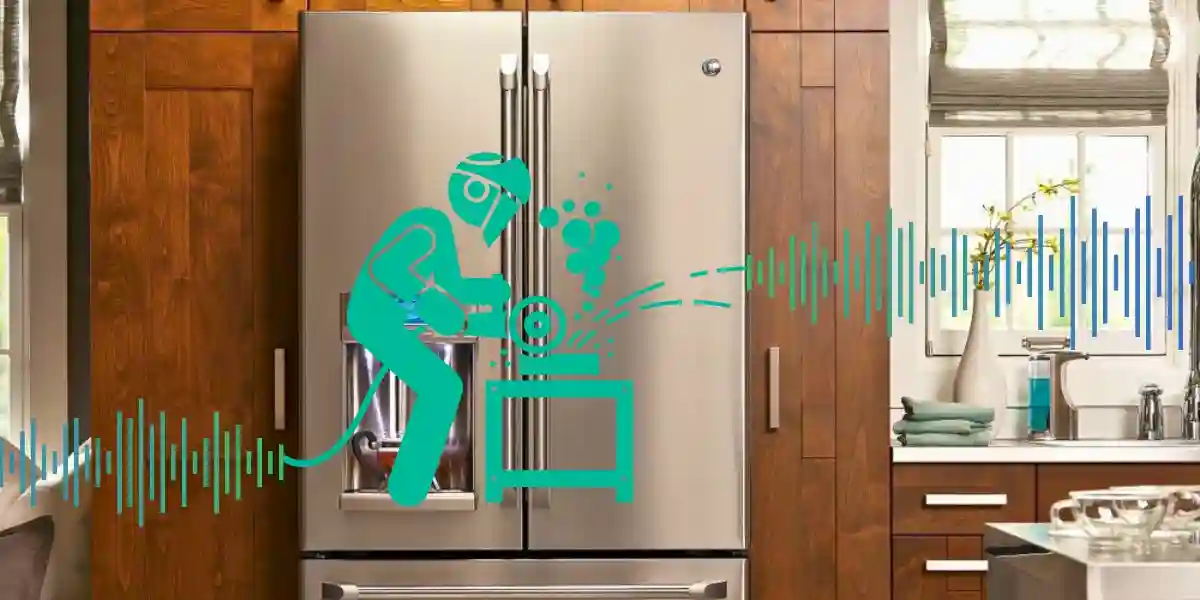
Why Is Your Frigidaire Refrigerator Making a Grinding Noise?
In order to figure out where the grinding noise is coming from, you can try a few different things.
Faulty Evaporator Fan Motor:
Your refrigerator’s evaporator fan motor circulates air to keep it cool. If it becomes faulty or worn out, it can emit a grinding noise.
Remove the back panel of the freezer compartment and locate the evaporator fan motor. Inspect the motor for any visible signs of damage or obstruction.
A broken blade or excessive dirt accumulation may indicate the motor needs to be replaced.
Damaged Condenser Fan Motor:
Condenser fan motors help dissipate heat from condenser coils. A damaged or worn-out condenser fan motor can result in a grinding noise.
Unplug your refrigerator and inspect the condenser fan motor. Look for any signs of damage or debris around the fan blades.
If you detect any issues, replace the motor according to the manufacturer’s guidelines.
Worn-out Bearings in the Compressor:
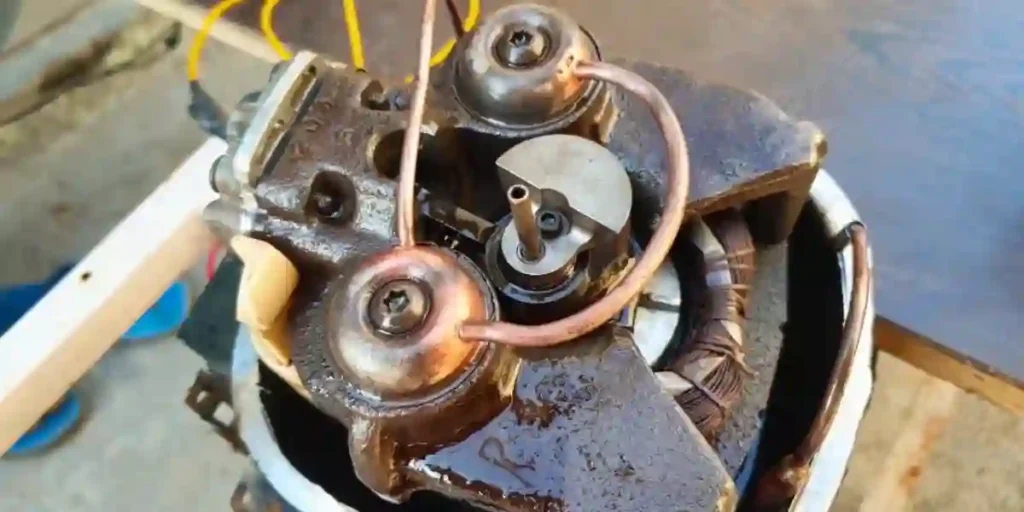
Bearings in the compressor, which compresses the refrigerant gas, wear out over time. If these bearings become damaged or worn, they can generate a grinding noise.
Compressor diagnosis requires professional assistance due to its intricate components. If necessary, contact an authorized Frigidaire service technician.
Defective Water Inlet Valve:
Some Frigidaire refrigerators are equipped with a water dispenser and ice maker. A faulty water inlet valve may cause a grinding noise when dispensing water or producing ice.
Locate the water inlet valve near the bottom of your refrigerator after unplugging it. Inspect the valve for any visible damage or clogs.
If you identify any issues, replace the water inlet valve as per the manufacturer’s instructions.
Ice Maker Issues:
If your refrigerator has an ice maker, it’s essential to examine its components. When the dispenser motor operates, ice cubes stuck in the dispenser can cause a grinding noise.
Remove any obstructions carefully and ensure the ice maker is properly aligned and connected. The ice maker motor might be faulty if the grinding noise persists.
The risks of ignoring a grinding noise in your refrigerator
Potential Mechanical Failure:
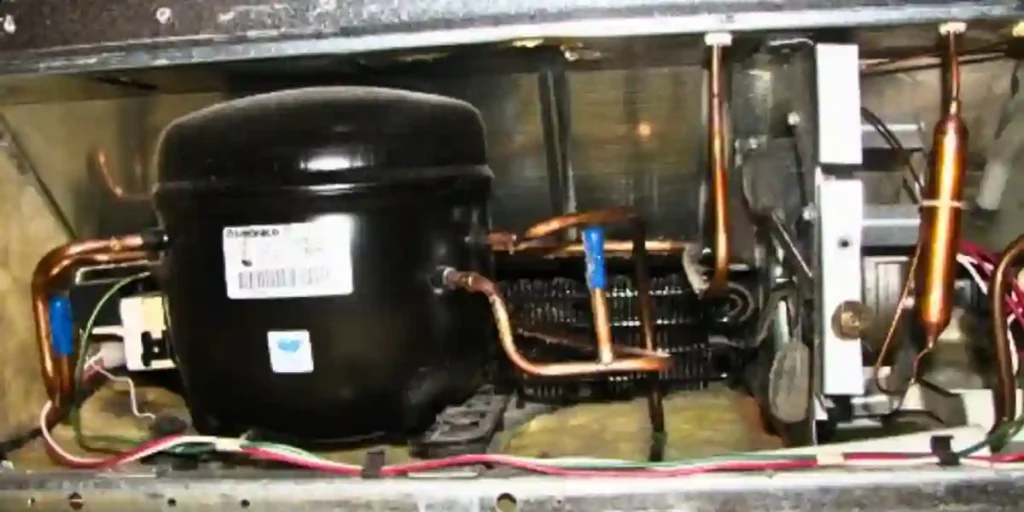
That grinding noise you hear is often an indication of an underlying mechanical issue within your refrigerator.
Ignoring this noise can lead to the failure of essential parts, including a malfunctioning refrigerator.
This can disrupt your daily life and food storage, and leave you with costly repair bills.
Increased Energy Consumption:
It can indicate a problem with the fan motor or compressor in your refrigerator. The refrigerator may use more energy if these components are not functioning optimally.
This translates into higher electricity bills, wasting both energy and money in the long run. Grinding noises can save you money by restoring your refrigerator’s efficiency.
Food Spoilage:
Your refrigerator is designed to keep your food fresh and safe. When a grinding noise persists without attention, it may indicate a compromised cooling system.
Food spoilage can be accelerated by inconsistent temperatures and inadequate cooling.
The consumption of spoiled food poses health risks, such as foodborne illnesses. Your stored food’s quality and safety are at risk if you ignore the grinding noise.
Water Damage:
Some refrigerators come equipped with features like water dispensers or ice makers. If the grinding noise originates from these components, there’s a possibility of water leakage.
You can damage your kitchen floor, cabinets, and appliances if you ignore this issue.
The moisture can also promote the growth of mold and mildew, creating an unsanitary environment.
Maintaining a clean and dry kitchen involves addressing grinding noises promptly.
Fire Hazards:
Unattended mechanical issues in a refrigerator can pose a fire hazard. Frayed wires or malfunctioning components can cause grinding noises.
A short circuit or overheating can result in a fire if not addressed promptly. The grinding noise can be mitigated by diagnosing and resolving it as soon as possible.
Factors Affecting the Frequency and Intensity of Grinding Noises
Age and Wear:
The age of your refrigerator plays a significant role in the occurrence of grinding noises. Motors, bearings, and belts can wear out over time, causing friction and mechanical strain.
As these parts deteriorate, grinding noises become more frequent and intense. An older refrigerator is more likely to suffer from such problems, requiring repair or replacement.
Maintenance and Cleaning:
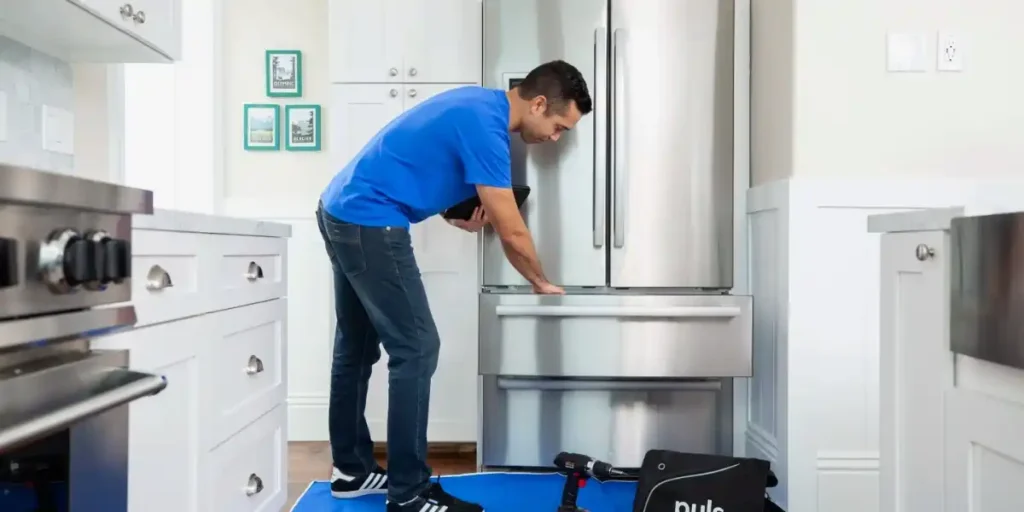
Grinding noises can be significantly reduced with regular refrigerator maintenance and cleaning.
The accumulation of dirt, dust, and debris on moving parts can cause grinding sounds.
You can extend the lifespan of your refrigerator by cleaning its coils and lubricating moving parts.
Environmental Factors:
Refrigerator grinding noises are sometimes caused by environmental conditions.
High humidity levels can cause moisture buildup, leading to corrosion and rust on components.
This corrosion can affect the smooth movement of parts, resulting in grinding sounds.
Extreme temperatures or direct sunlight may cause a refrigerator to make more noise.
Installation Issues:
Improper installation of your refrigerator can be a contributing factor to grinding noises.
Vibrations and rattling can cause grinding sounds if the refrigerator is not level or stable.
Level your refrigerator and adjust its supporting components, such as leveling feet.
This can help minimize vibrations and reduce the occurrence of grinding noises.
Type of Refrigerator:
The frequency and intensity of grinding noises may vary depending on the refrigerator type.
A dysfunctional motor, valve, or solenoid in a refrigerator can cause grinding sounds. Your refrigerator’s design and components can assist in identifying the noise source.
Maintenance Tips to Prevent Grinding Noises
Keep it Clean:
Regular cleaning is vital for maintaining optimal refrigerator performance. Clean the interior regularly, removing any spilled liquids or food debris that may have accumulated.
Pay attention to shelves, drawers, and seals, ensuring they are free from dirt or residue. Use mild detergent and a soft cloth to clean the exterior of the refrigerator.
Cleaning your refrigerator minimizes the risk of obstructions or buildup that can cause grinding.
Check and Clean the Condenser Coils:
The condenser coils, located at the back or beneath the refrigerator, play a crucial role in heat dissipation.
Dust and debris can accumulate on these coils over time, impairing their efficiency.
Clean the condenser coils regularly with a brush or vacuum cleaner attachment.
Maintaining proper airflow and preventing excessive strain on the compressor reduces grinding noises.
Inspect and Lubricate Moving Parts:
For smooth operation, lubricate moving parts such as fan motors, hinges, and pulleys. You can find the recommended lubricant type in your refrigerator’s user manual.
Apply the lubricant as instructed by the manufacturer, taking care not to over-apply. Wear-out or strained components can cause grinding noises if not maintained properly.
Check Door Seals:
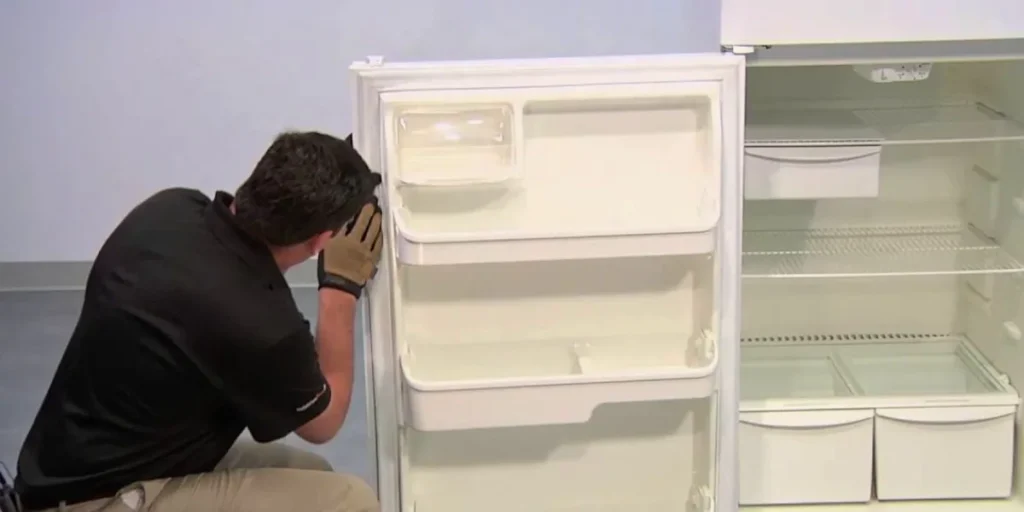
It is crucial to properly seal refrigerator doors to prevent excessive strain on the cooling system.
Regularly inspect the door seals for any signs of wear or damage. Make sure the seals are clean and free of debris and that they form a tight seal.
If you notice any worn-out or damaged seals, replace them immediately to prevent air leakage.
Avoid Overloading:
Overloading your refrigerator can strain its components, potentially leading to grinding noises.
Distribute items evenly to maintain proper airflow and follow the recommended storage capacity.
Avoid blocking air vents or placing items in a way that obstructs the movement of fans or motors.
You can ensure smooth and quiet operation by adhering to the refrigerator’s load limits.
Water Dispenser & Ice Maker Inspection:
If your refrigerator has a water dispenser or ice maker, pay close attention to these components.
Check for any leaks, loose connections, or signs of damage. Water inlet valves, dispenser motors, and related parts must be checked for proper operation.
Regularly clean the dispenser and ice maker to prevent obstructions and grinding noises.
FAQs About Frigidaire Refrigerators and Grinding Noises
Is A Grinding Noise In My Frigidaire Refrigerator Dangerous?
While a grinding noise itself may not be dangerous, it often indicates an underlying problem with the refrigerator’s components.
Mechanical failures, higher energy consumption, food spoilage, and even fire can result from noise. It’s important to address the issue promptly to prevent further damage and potential risks.
When Should I Service My Frigidaire Refrigerator?
Regular maintenance is essential to keep your refrigerator in good working condition. Periodically clean the inside and outside, clean and lubricate the condenser coils, inspect door seals, and avoid overloading.
It’s recommended to consult the user manual for specific maintenance guidelines and frequencies.
What Should I Do If I’m Unable To Resolve The Grinding Noise Issue In My Frigidaire Refrigerator?
If your troubleshooting efforts don’t resolve the grinding noise, it’s best to seek professional help.
Contact Frigidaire customer support or schedule a service appointment with an authorized technician. Your refrigerator will perform at its best with its expertise and tools.
Conclusion
Don’t let a grinding noise from your Frigidaire refrigerator disrupt your peace. Take action now to diagnose and resolve the issue.
Clean, lubricate, and inspect components regularly. If the problem persists, reach out to Frigidaire customer support or schedule professional assistance.
Ensure a quiet and efficient refrigerator, keeping your kitchen running smoothly.
